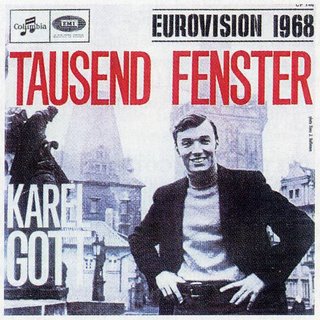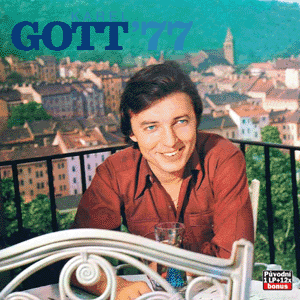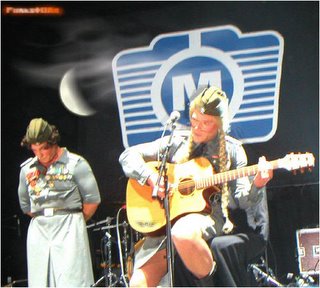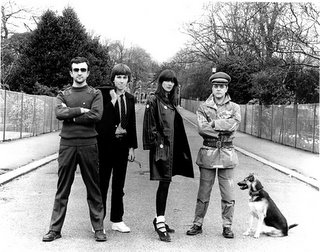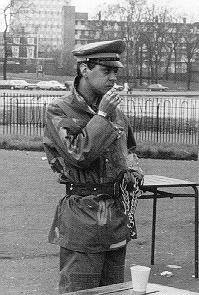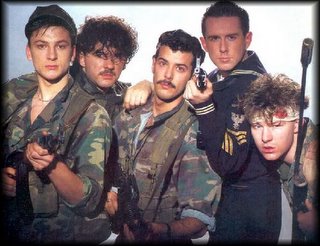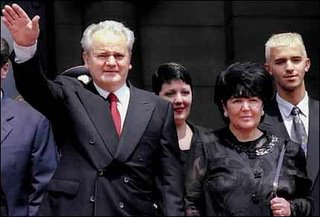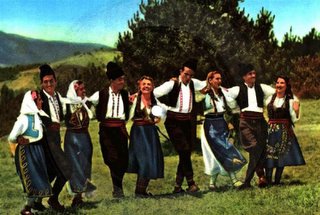 Serbian Music is Great
Serbian Music is Great
I love Serbian music because it is mental. It makes me jump up and down like a madwoman. I love the maniacal keyboard and accordian solos, which sound like someone has pressed the 'own tune' button on an 1980s Casio keyboard and then dropped it into a cement mixer.I love the fact that it is relentlessly upbeat.
I love the Middle Eastern style vocals, the cheap sounding production, and the heavy reliance on reverb. And I love it despite the fact that I can't understand a word of Serbian, and that listening to it makes me the
laughing stock of my family and friends (my brother cruelly calls it 'kebab shop music' ). I am convinced that Serbian music (and I don't mean Goran Bregovic) has yet to enjoy the attention it deserves outside the Balkans.
Here are some of the fellas and ladies whose tunes have recently been sending me hopping around the room like a whirling dervish. They make 'novokompanovana narodna musika' (or NNM as I like to call it), which is updated Serbian folk music, and more contemporary variations on NNM (see Turbofolk).
The styler pictured above left is Saban Saulic (pronounced 'Shaban Shauwlich'), the top selling singer in former Yugoslavia. He is proper old school, and released his first record in the late 1960s. His music ranges from the very traditional - check out 'Na angela licis' and 'Bio Sam Pijanac', the perfect soundtrack to a trek through the mountains of former Yugo land - to the slightly more contemporary - the wistful 'Odlazis Odlazis' is magic . He has a stunner of a voice, and that's why he is the grandaddy of NNM. Pop fact: Saulic wore a toupee until the 90s, when he revealed that he was actually as bald as a coot. Hasn't stopped him shifting units like a don.
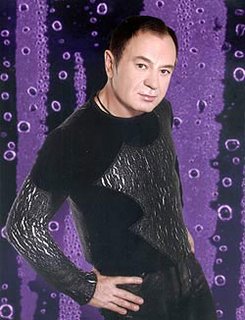
Its life Jim: Mile Kitic does 'Blue Steel'
The next chap, pictured above, is neither Marc Almond's dad nor a Trekkie, but Mile Kitic, another singer who seems to have been around for a while - judging by his toons and photos. Another traditionalist then, you might think. Well, not completely. Check out Kitic's 'Policijo' -his very own 'Fuck tha Police' - a storming Balkano-stomp.Great. Other cool numbers are the very oriental 'Lazu me zelene Oci' (Close your eyes and you could be in Istanbul), the retro bop-tastic 'Casa ljubavi' (think a South central European 'Summer Holiday'). And the peculiar Yugo-cod reggae of 'Mala iz novog pazara' is definately also worth a listen. Mile's voice is, in my view, a bit easier to listen to than Saulic's.
Sadly I am a bit short on information about Mile - any biogs in English or German would be gratefully recieved!
Next up is top crooner Dragan Kojic Keba (see pic below). Keba looks like right spiv, but sings like a God. He churns out the same trad folk as Kitic and Saulic, but also often ventures into more poppy territory. He also has a more distinctive voice. Again, finding any info about Keba in a language which I understand is proving tricky. Pictures from his concerts suggest that he is a big hit with the laydeez. Pop fact: In 1995, when the Serbs were puffing their chests out, Keba claimed that the Rolling Stones had 'plagiarised' Serbian music with 'Paint it Black.' I think he might have been one Shljivovitca over the eight. Keba songs worth checking out are 'Manglave Daje' for Greek meets Arab marching band fun, the jolly 'Lilijana, ' and, if you can stand it, the absolutely bonkers 'A Romnije,' which sounds like a Tyrolean mountain band in a car crash with Django Reinhart.
Open or wrapped? Dragan Kojic Keba
Keba also dabbles in Turbofolk, the faster, cruder, urban son of NNM. It is a genre which was much derided for promoting Serb nationalism and Serbian gangsta livin' during the Yugoslav wars. Turbofolk is a source of endless fascination for cultural theorists, and the subject of many a ponderous article. Here is a lengthy, but good entry on
Turbofolk in Wikipedia, and radio
B92 (Belgrade radio station) producer's definition.
Although, as Wikipedia claims, it is not easy to tell where one style ends and the other begins, Turbofolk can perhaps be distinguished from its predecessor by its incorporation of western elements such as electric guitar, and heavier, dance-orientated beats, as well as by the singers themselves, who are generally under 40 (although this is changing).
Which takes us on to one of the high priestess of the genre, Svetlana 'Ceca' Raznatovic (pictured below). Ceca is probably the only Serbian singer to be known in English-speaking countries, and definately for the wrong reasons. Silly old Ceca was married to
Arkan, the nasty Serbian paramilitary leader and career criminal who was assassinated in 2000. His wife was subsequently linked to the murder of Serbian PM Zoran Djindjic, and apparently she still has lots of suspect connections with the mafia and the Serbian radical party.
But despite being the pin-up of the Serb nationalist movement, Ceca is probably the most successful female singer in former Yugoslavia, and has fans all over the Balkans, not just Serbia. This may be partly based on her, ahem, aesthetic appeal, partly for political reasons, and possibly also because she's recorded a few good tunes
She has a husky voice, which isn't as strong as Keba's, but nonetheless has its raspy charm. She knows how to do the Serbian waily thing quite well. She has done some lovely versions of Serbian traditional songs such as 'Cipilice,' and I love the ueberfolk of 'Eh Tesko Meni.' She also does the Gypsy thing quite well - listen to 'Za Malo' and 'Nagovori' for brass band Balkania.
Pop fact: Ceca, like many Serbian gangsta molls, has had a
lot of plastic surgery. No one image seems to do her surgery justice, so you'll have to make do with a lovely photo of pre- op Ceca with Arkan, when they were a kind of thuggish Posh and Becks, and one of her after her transformation.
Balkans or bust? Above (top): Svetlana 'Ceca' Raznjatovic pictured with cuddly hubby Zjelto 'Arkan' Raznjatovic. (below) Ceca gives Dolly Parton a run for her money.This lot are my favourites at the moment, but others worth checking out are Dragana Mirkovic, Semsa Suljakovic, and Sinan Sakic. There are, of course thousands more....
If you fancy a taste of Serbian music, try some of these
Serb radio stations (select the ones offering 'Narodna Musika'). Radio Naj,
Suton Radio, rtv Mega radio, and
Radio Okic, are all Turbofabulous. The quality varies greatly, and you're better off listening to stuff in Itunes than using Real Player.
Since discovering Serb music, I have wanted to visit Belgrade, my musical Mecca. So last year, some friends and I went over for New Year's eve. It was bliss. Folk-tastic! Picture it - early evening in Belgrade, and I am at Serbian friend's house. To his horror and amusement, I insist that we watch the annual folk knees-up on the NTV Pink channel. Pink has a shaky reputation, because it churned out Turbofolk during the Yugoslav wars as well as apolitical fluff. The station's un -PC credentials were compounded by the fact that until 2000, it was owned by a supporter of Mira Markovic's (Milosevic's wife) United Left party. Oh dear.
Turbo-tastic: NTV Pink
'For god's sake, put your arm down, you fool!'
Mira Markovic with some hanger-on.
But now, in peacetime, under new ownership, and with Turbofolk losing its dodgy reputation, Pink is a bit like ITV, but trashier. It's festive array of Serb folk stars are a sight to behold. Definately worth the drive from Italy. The women, not one of them a day younger than 40, and averaging at least 55, are trussed up like Christmas turkeys - all exposed flesh, short skirts, cleavage, and thick, thick make up. The men are less flashy, dressed more modestly, a bit like head waiters. The singers crowd the stage, vying for the attention of the camera, clearly in competition with one another, but trying to maintain a facade of friendly cameraderie. It gradually becomes a kind of sing-off, each folk-phenomenon out wailing the other. As they lip-synch (yes, lip-synch) their way through a medley of folk greats, a row of dancers in Yugo-kilts do a kind Serbian Riverdance around them. It lasts for ages, but the singers, being the pros that they are, don't let their forced smiles slip for a moment. Afterwards, reeling in the joy of my first NTV Pink experience, I tuck into a fabulous Balkan spread with my friends, and I ask them how I might receive the channel in Germany. They respond with sighs and raise their eyes collectively heavenwards.

Mutton as Kapama? Dragana Mirkovic
30 minutes later- Cut to Republic square, Belgrade 23.40. My friends and I stand in a huge crowd of New Year's revellers. On stage a man who bears a startling resemblance to Father Christmas belts out tune after tune of jump aroundy modern folk to rapturous applause and screams. He is Luis, one of Serbia's top folksters (and whose music I am unable to find). As we jig around to his tunes, avoiding the firecrackers, the count down begins Tri.... Dva... Jeden!!!!! (I count down in Czech, because its a bit like Serbian - well its Slavic innit?).
Irony of ironies - having raved about the music for the previous week, the following night, my companions and I, who are sharing a flat, are kept awake until 4am by a Turbofolk karaoke night taking place in the bar below us......
Until next week....
The right response to Serbian music





